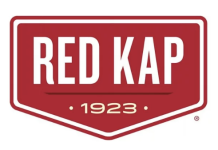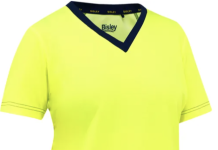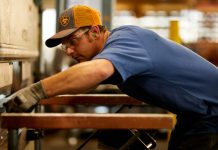If your work is tough, you need work clothes that are just as tough. You need clothes made for working people, workwear that can withstand the rugged job you put them through. You need workwear that is durable, comfortable, and protective, from the best brands like Carhartt, Wrangler, Bulwark, Filson, Dickies, Red Kap, Under Armour, Wolverine, and more.
When it comes to deciding on the right work clothes for your particular job, it often comes down to the type of fabric you choose. Cotton duck is the most popular fabric for workwear. It is weighty and strong, coming from the Dutch word doek, which was a fabric once used to make clothing for sailors. It’s also the same type of fabric used to make sails, tents, shoes, sand bags, and other rugged products, since it is so resistant to tearing and can handle rough use.
Leather is another highly popular workwear fabric. It is generally considered to be the most durable, protective fabric and is also known for being able to form fit your body, whether as gloves or jackets, pants or chaps, or various other uses. In a lot of ways, it’s kind of like a tough second skin you can wear, which makes sense, given its origin.
Denim is another very popular workwear fabric and is most commonly known for jeans and jean jackets. It is a rugged cotton twill fabric, and though it is not quite as durable as cotton duck, it is a little more comfortable. Ring spun cotton is another popular option. When it is made, the cotton fiber threads are twisted together very tightly before being made into a fabric, which makes the threads stronger than regular cotton. Flannel is also very popular, and is almost always 100% cotton. It is very comfortable, very warm, usually isn’t very expensive, and is used for everything from shirts to bedsheets, making it a great option when you are outdoors in cold weather and also when you want a softer fabric against your skin. Synthetic fabrics are becoming more and more common in the workplace. Nylon, polyester, and many others are being used because they can often offer what natural fibers cannot — such as flame-resistant or waterproof properties.
Oftentimes, when it comes to choosing the best work clothes, it’s important to consider the different ways that different fabrics can benefit you. If you have a job where your pants take a real beating day in and day out, denim probably isn’t the best choice for you, since it won’t last nearly as long as cotton duck, leather, or synthetics. However, if you’re moving around a lot and comfort is important so that you don’t get abrasions on your legs when you move, leather or cotton duck probably isn’t the best way to go — you’d be more happy with flannel-lined pants or denim.
The elements in which you work and the safety requirements also may dictate the type of workwear fabric you need to choose. When you work outdoors in the winter and spring, waterproof fabrics are an absolute must. Usually, this means your boots will normally have GoreTex or another type of waterproof membrane. Waterproof pants, gloves, and coats can be especially effective in warding off the elements. These waterproof fabrics are often synthetics, just like flame-resistant fabrics. When your job requires protections from flames, sparks, and electrical arcs, it’s important to be protected. Flame-resistant shirts, pants, jackets, boots, gloves, and more are made from special synthetic fabrics that will extinguish a flame immediately.
In any case, no matter what type of fabric you choose or what type of job you have, it is important to launder and care for your work clothes according to the specifications of the fabric. Laundering denim is very different than laundering FR shirts, and it is important to follow the care instructions so that your work clothes will remain durable, comfortable, and protective for years to come. When you are looking for any type of the workwear mentioned, Working Person’s Store is your go to for the best in quality work and footwear!




